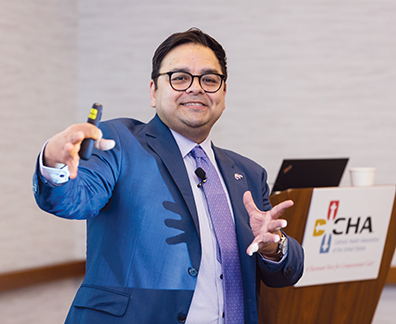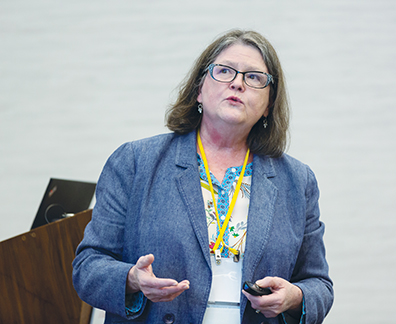Use opengraph image in content:
No
Display related media icon:
No
By LISA EISENHAUER
INDIANAPOLIS — When engagement surveys and feedback from leaders showed employees were struggling under the stress of the COVID-19 pandemic and concurrent crises, a CHRISTUS Health team crafted a strategy to help employees cope called Resource,
Recovery, Respond.

George Avila, system vice president for mission integration, discusses at a session of the Catholic Health Assembly the well-being resources and programs CHRISTUS Health has made available to its workers.
Jerry Naunheim Jr./© CHA
George Avila, system vice president for mission integration, and Dr. Linda Ray, program director of Clinicians Care peer resource network, discussed the effort in a packed session on June 6 at the 2022 Catholic Health Assembly here. The CHRISTUS Health
initiative had the backing of mission, spiritual care, human resources, strategic marketing, finance and other departments and built upon the system's employee
assistance program and other existing resources to address employees' mental health
and well-being.
Because CHRISTUS has ministries in Mexico, Chile and Colombia as well as the Southwestern United States, Avila said the surges of the COVID-19 pandemic have been relentless for the system, worsening in some markets while easing in others. On top of that
pressure, regional divisions coped with hurricanes that slammed Louisiana, a blizzard that knocked out power in parts of Texas and political unrest that brought protesters to the streets in Chile and Colombia.

The audience reacts to a speaker during an Assembly session on CHRISTUS Health's integrated approach to associate and clinician well-being.
Jerry Naunheim Jr./© CHA
CHRISTUS' "three R's" strategy provided a baseline of wellness resources for all associates, intervention to help staff process their emotions and recover during emergencies or sustained crises, and response to critical incidents that could lead to trauma
or compassion fatigue.
To promote staff well-being, CHRISTUS started hosting "Resilience Wednesday" events around a theme that changes every month. The system creates guides for team leaders to use in special huddles to promote the theme and resources associates can use on
their own.
Last September, for example, the theme was gratitude and one of the exercises was a seven-day "gratitude challenge." CHRISTUS encouraged associates to adopt several practices, including writing down and then reflecting each day on things that they or
others did that brought them joy.
For situations that called for recovery assistance, one of the steps CHRISTUS took was to expand its existing contract with Stericycle, which makes follow-up phone calls to check on discharged patients. Trained registered nurse advisers with Stericycle
proactively check in with CHRISTUS' nurses and other clinicians, offering them comfort, counseling, and support. To date, Avila said Stericycle has made 18,000 calls to CHRISTUS caregivers.

Dr. Linda Ray, program director of Clinicians Care peer resource network at CHRISTUS Health, tells the audience about the extra level of wellness services the system provides for clinicians.
Jerry Naunheim Jr./© CHA
To respond to staff distress during peak stress conditions, Avila said CHRISTUS has built up its pool of staff who are certified in critical incident stress management. Those team members are available to talk to staff in person or virtually to help them
navigate adversity, adapt to the situation and cultivate resilience. Also, multidisciplinary teams called Patient Family and Associate Action Teams provide immediate support on impacted units.
Ray said CHRISTUS provides additional support to its physicians through the HoneyComb Project. Resources include lectures, written material, self-care advice and outreach just for its doctors.
The program includes a peer support network for doctors who self-identify as stressed, are identified by others as showing signs of distress or are facing a legal or a medical board complaint, Ray explained. For those doctors, a peer reaches out within
three days to offer confidential and intentional support and connections to other resources.
Some of CHRISTUS' well-being resources are available for download at ow.ly/FRlI50JtNZF.